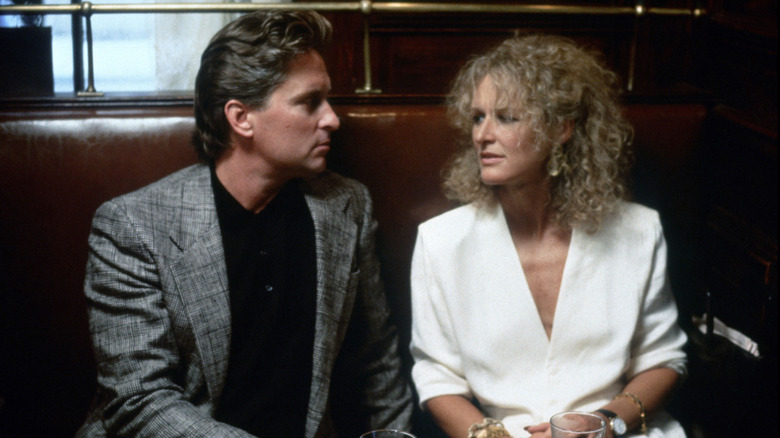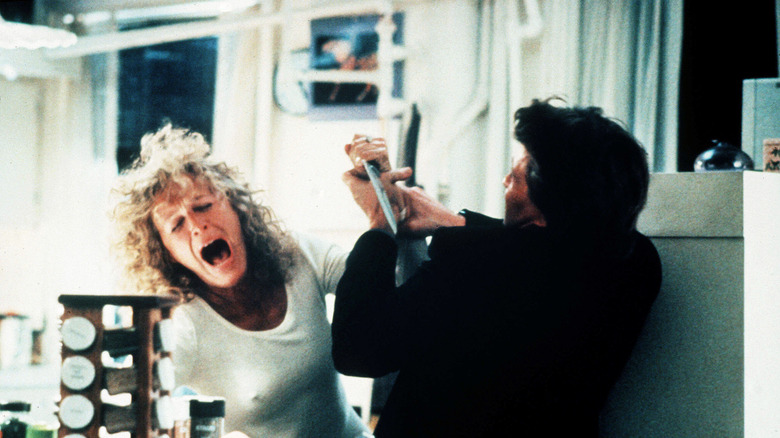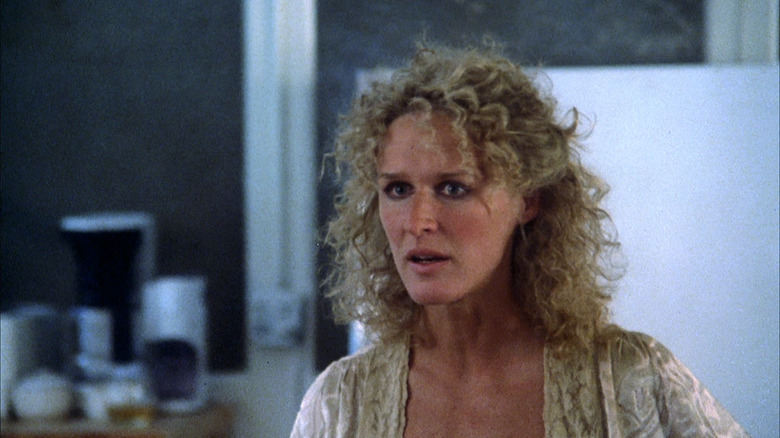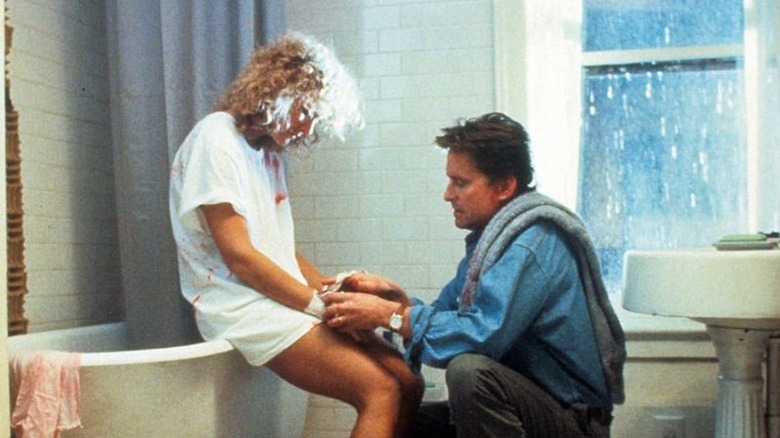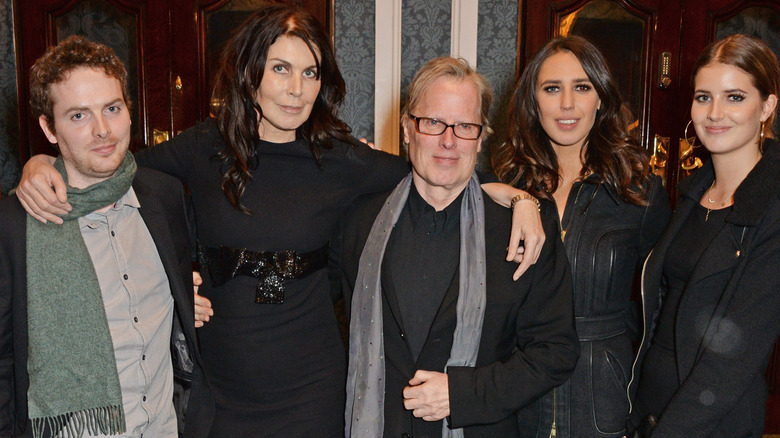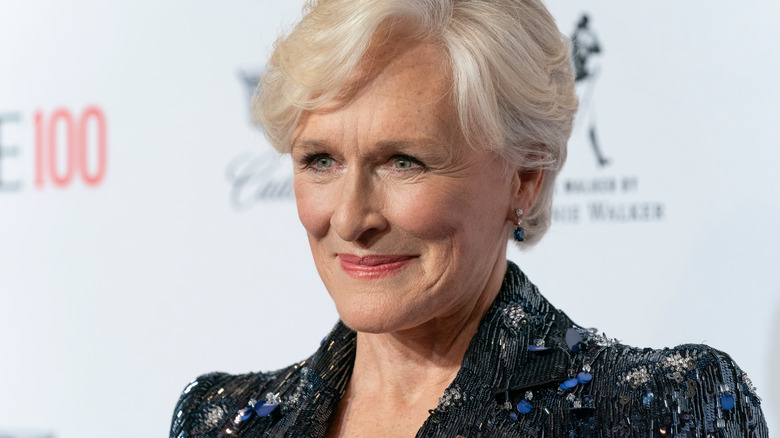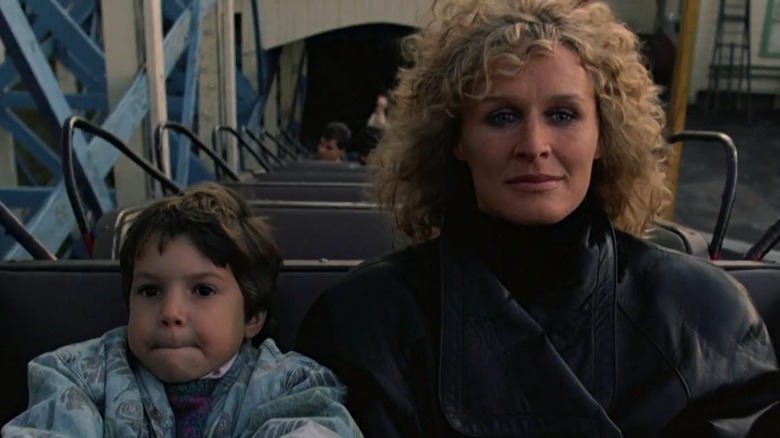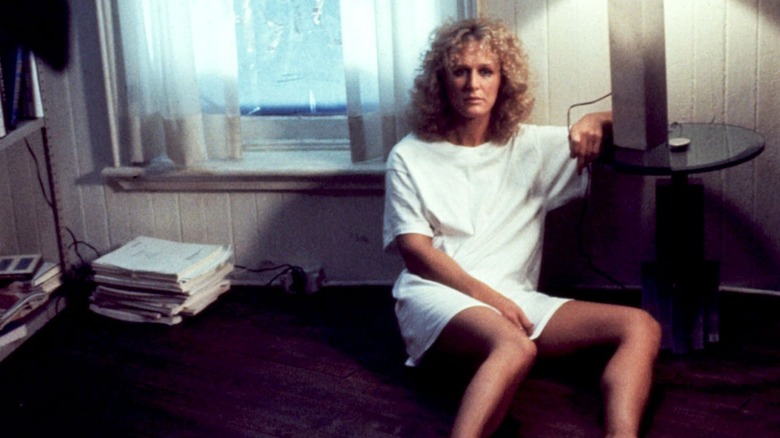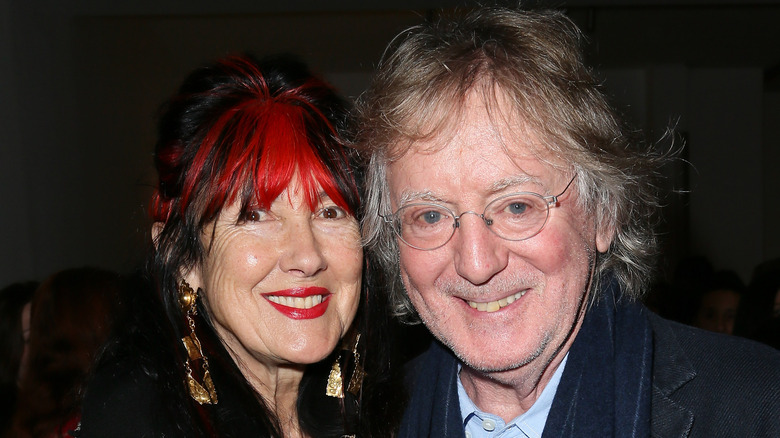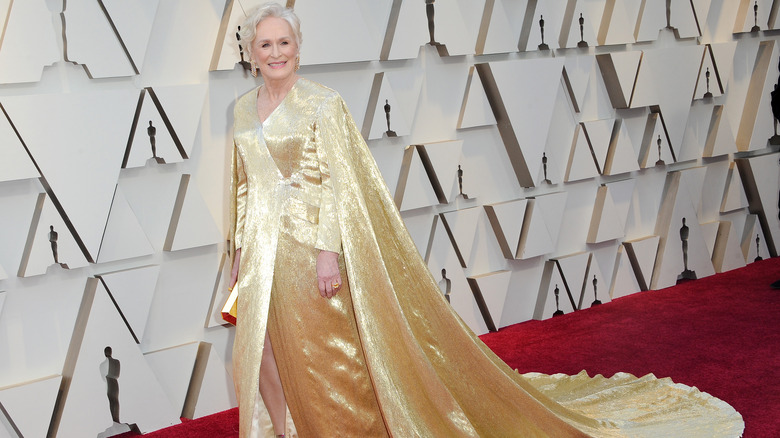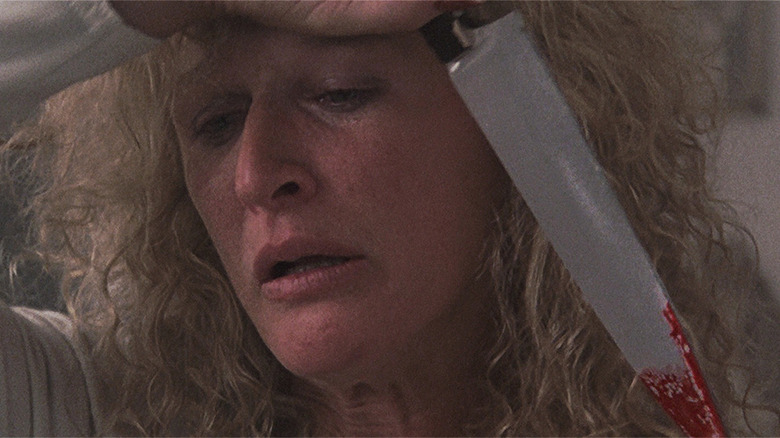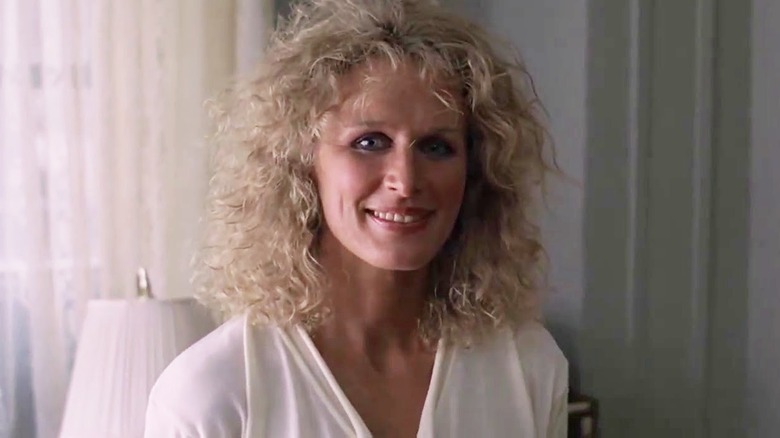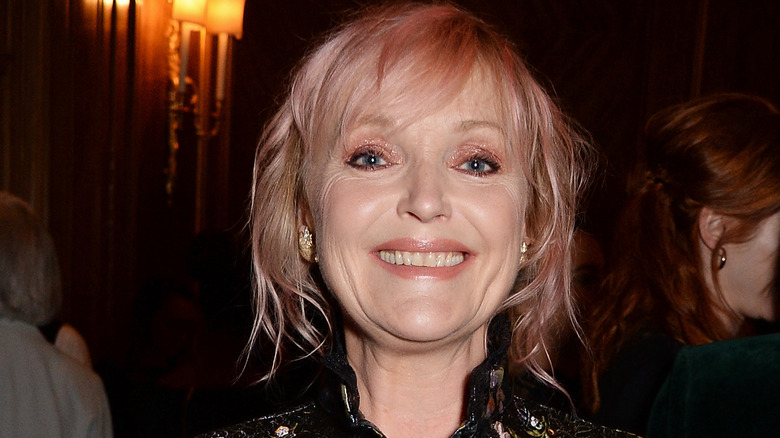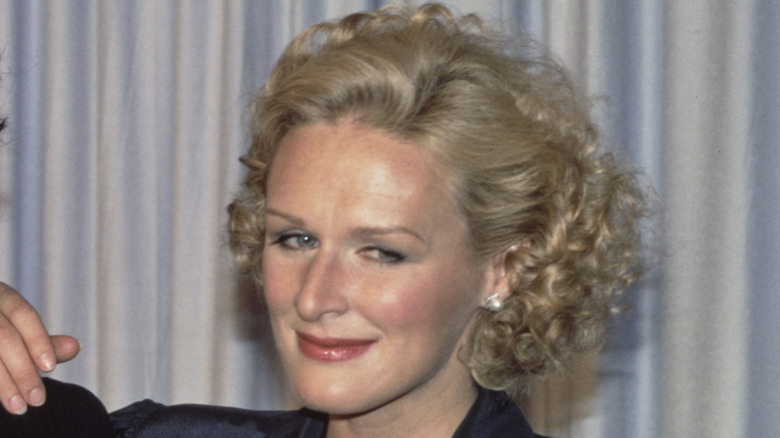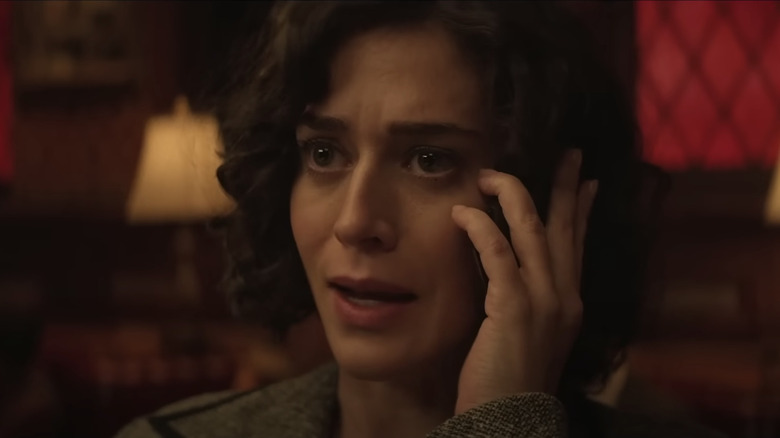The Untold Truth Of Fatal Attraction
Here's your question: What film made $320 million worldwide, garnered six Oscar nominations, and is the reason the term "bunny boiler" is now an entry in the Oxford English Dictionary? The answer, of course, is the 1987 film "Fatal Attraction," starring Glenn Close and Michael Douglas. Apart from "Basic Instinct," "Fatal Attraction" remains one of the most famous erotic thrillers of this era, spawning new (and mostly derogatory) language about female rage and psychosis.
In "Fatal Attraction," Glenn Close plays Alex Forrest, a seemingly unhinged woman with whom family man Dan Gallagher (Michael Douglas) has an affair. Not content with a one-night stand, Alex quickly becomes obsessed with Dan and tries to destroy his marriage, and, ultimately, his life. Like any good erotic thriller, "Fatal Attraction" ends with bunny torture and murder (in that order), a horrifying sequence of events that leaves viewers with more questions than answers. You might think everything you need to know about the film is right there on the screen — what could be more shocking than what happens to that poor rabbit? — but the behind-the-scenes secrets of the film are just as fascinating. You might be surprised to learn the following things about "Fatal Attraction."
The film originally had a totally different ending
The ending of "Fatal Attraction" is hard to forget. After killing the family's pet rabbit, Alex attacks Dan's wife, Beth, with a kitchen knife. Dan tackles Alex and seemingly drowns her in the bathtub, but she improbably survives. Beth comes back with a revolver and shoots Alex in the chest, finally killing her. This, however, was not how the film was supposed to end. The original ending, of the film, as written by James Dearden, had Alex kill herself and frame Dan for murder.
But when they showed this ending to audiences, they hated it. According to studio executive Ned Tanen, audiences despised Alex so much "they want[ed] us to terminate the b*tch with extreme prejudice." So the studio demanded that the ending be changed to please the viewers. Close, as well as director Adrian Lyne and producer Sherry Lansing, hated the new ending. Lyne was persuaded to shoot it after he was offered $1.5 million, but Close was furious about the change and initially refused to shoot it, arguing that the change totally annihilated her character. She eventually gave in, though, and reshoots were filmed a full six months after the film initially wrapped. Many critics, such as Roger Ebert, categorically detested the new ending, so it seems that maybe Close was right all along.
Glenn Close wanted a remake from the female perspective
"Fatal Attraction" star Glenn Close has often spoken quite frankly about some of the representational issues of the film, especially in regard to how it represents women and mental health issues. While Close wanted to give her character Alex the complexity she deserved, the film's rewritten ending eliminates any chance of such complexity, painting Alex as an outright villain. Close thinks this could (and should) change. Speaking with IndieWire, Close spoke of her love for the character and her desire to go back and remake the film from Alex's point of view, which would allow for the nuance and complexity that the original film so staunchly foreclosed.
Three decades after "Fatal Attraction" hit theaters in 1987, Close is finally getting her wish. In 2023, Paramount+ debuted a "Fatal Attraction" limited series, set in the present day and starring Lizzy Caplan as Alex, Joshua Jackson as Dan Gallagher (replacing Michael Douglas), and Amanda Peet as Beth Gallagher (the role once portrayed by Anne Archer). According to TheWrap, Alexandra Cunningham, known for her work on "Desperate Housewives" and "Dirty John," will serve as the showrunner. In announcing the series, Paramount+ described the new "Fatal Attraction" as "a deep-dive reimagining of the classic psychosexual thriller and '80s cultural touchstone" which will "explore themes of marriage and infidelity through the lens of modern attitudes toward strong women, personality disorders, and coercive control."
The movie was based on a short film
In 1979, "Fatal Attraction" screenwriter James Dearden released a short film called "Diversion," which was about a married man who has an affair while his wife is away only to find that his mistress wants much more than a one-off encounter. One of "Fatal Attraction's" producers, Stanley R. Jaffe, saw the short and took it to Sherry Lansing.
Lansing was immediately taken with the short and found that it related to her own life. "I had my own experience when I was rejected [by a man], and I felt like he took my soul," Lansing told The New York Times. Lansing was committed to getting the film made, but says it was rejected twice by studios that felt it was about "a guy who cheats on his wife for absolutely no reason!" She had Dearden rework the script for a feature-length film. In Dearden's words: "To turn it into a mass-audience film, I knew there would have to be an escalation of the psychological violence, which in the end becomes physical.” It wasn't until director Adrian Lyne came on board that the project finally took off, eventually becoming the household name it is today.
Screenwriter James Dearden went on to write a stage play based on his original script
The story of "Fatal Attraction" did not end with the 1987 feature film. Screenwriter James Dearden wrote a play based on the original script that premiered in London's West End in 2014. Like Close, Dearden was disappointed in the ending that was eventually chosen for the film, and the play in part works to rectify that narrative. Dearden rewrote the plot for the play, complicating the characters and making the ending more in line with what he originally had in mind for the film.
In Dearden's own words: "whilst remaining faithful to the storyline, I have introduced the ambivalence of my earlier drafts ... nobody is entirely right and nobody entirely wrong." Sadly, the bunny is still boiled in the play. According to The Atlantic, the play remains firmly rooted in melodrama and is "acted at high volume with no insight into the psychological question at its center." (It was more positively reviewed at The Daily Beast). The play also emphasizes Alex's connection to "Madama Butterfly," the opera that seems to inspire Alex's decision to commit suicide in the film's original ending.
No one believed Glenn Close could play the role at first
After casting Michael Douglas as Dan, casting for Alex proved to be much more difficult. According to producer Sherry Lansing, they auditioned many actresses and were turned down by almost everyone, including Barbara Hershey. Glenn Close was really committed to playing the role, but almost no one believed she could do it. Director Adrian Lyne thought she wasn't right for the part because she only played nice characters. Co-star Michael Douglas wasn't a believer either because "she always projected a Puritan vision." He said they were "doing [Close] a big favor" by even letting her read with him. Lansing has said they had such a strong belief that Close wasn't right for the role that they didn't even want to be in the room when she auditioned.
Close, however, knew that she could do it, and wanted to challenge herself to do something she had never done before. Of course, Close proved them all wrong, and now the film is unimaginable with anyone else as the lead. Close's dedication to the role paid off, and she was nominated for Best Actress at the 1988 Oscars, though she lost to Cher in "Moonstruck." (Michael Douglas also won that year, but not for "Fatal Attraction." He won Best Actor for his performance as Gordon Gekko in "Wall Street".) Close's nomination in 1988 was her fourth Oscar nomination at that time, and in total she has been nominated eight times, thus holding the record for receiving the most acting nominations without a win. She shares this record with British actor Peter O'Toole.
Michael Douglas had to yell at a six-year-old actress to get her to cry
Interestingly enough, one of the most difficult scenes to shoot involved a six-year-old girl who played Michael Douglas' daughter in the film. Ellen Hamilton Latzen played Ellen, Dan's daughter in the film. (It's her pet rabbit that gets unceremoniously cooked by Alex). In one scene where Dan and Beth are fighting in their suburban home, Ellen was supposed to break down crying.
According to Latzen, she was told not to speak and was standing there holding her stuffed animal while the scene unfolded in front of her. In order to induce the waterworks, Michael Douglas came up to her and yelled, "Look at that stupid unicorn. I'm going to throw it in the garbage." Douglas continued yelling at Latzen until she broke down in tears, after which the director Adrian Lyne finally yelled "Cut!" According to Douglas, he felt guilty afterward and apologized to Latzen for yelling. But, as Douglas put it, "you've got to do what you've got to do."
Latzen's career as a child star was fairly short, and she only starred in a few other projects following "Fatal Attraction." Most notably, she played Randy Quaid's daughter in the holiday classic "National Lampoon's Christmas Vacation." Douglas and Latzen reunited at a Hollywood event in 2016.
The film received a lot of backlash upon its release
Though "Fatal Attraction" was a hugely popular movie, it wasn't well-received by all audiences. Feminists in particular found it offensive to women. In her famous book "Backlash: The Undeclared War Against American Women," feminist author Susan Faludi argued that "Fatal Attraction" taught audiences "the incompatibility of career and personal happiness ... Women's lives were framed as morality tales in which the 'good mother' wins and the independent woman gets punished." In a review of the film in The LA Times following its release in 1987, USC film professor Marsha Kinder called the film "a clear attack on women's sexuality, the independent woman and the career woman. It seems quite hateful," she said.
In addition, psychologists have noted that the character of Alex has often been understood as someone who suffers from Borderline Personality Disorder, an assumption that is harmful to people who live with BPD themselves. Though Close did consult with psychologists while working on the film, the effort she made in trying to understand and sympathize with Alex does not show up on screen. The nonprofit Mental Health America has taken the film to task for its portrayal of mental illness and its demonization of Alex.
Close herself has acknowledged how the film negatively portrays mental illness, noting that "most people with mental illness are not violent" and "it is immoral to keep that [idea] perpetrated." In 2010, Close actually founded a nonprofit organization called Bring Change 2 Mind, which aims to reduce the stigma surrounding mental illness and start much-needed conversations around these issues.
It took years to find the film's director
"Erotic everyman" Michael Douglas was the first name attached to "Fatal Attraction." After he signed on, the work of finding a director and a co-star began. Brian De Palma was initially interested in taking on the project and wanted to give it the feel of a horror movie. However, he was unhappy with the choice of Michael Douglas as the lead. "I can't do the movie with Michael. He's unsympathetic. So it's either him or me," De Palma said. In the end, De Palma exited the project and Douglas remained in the lead role.
Another director who was seriously considered was John Carpenter, known for originating the "Halloween" franchise. Carpenter, however, didn't like the idea, saying "Fatal Attraction" was basically the same film as "Play Misty for Me," the 1971 film starring and directed by Clint Eastwood. (Carpenter also turned down directing Tom Cruise's "Top Gun" around this time). The film's eventual director, Adrian Lyne, was known at the time for directing "Flashdance," and went on to direct several other erotic thrillers such as "Indecent Proposal," "Lolita," and "Unfaithful." It was Lyne's attachment to the film that finally "reanimated" the project.
Glenn Close was pregnant during reshoots
The reshoots for "Fatal Attraction" — during which a newly written ending for the film was shot — occurred six months after the film had originally wrapped. Glenn Close was actually pregnant during this time, but didn't yet know it. After filming the violent death scene in which she gets drowned in the bathtub, Close suffered a concussion and wound up in the hospital. It was at this time she found out she was pregnant, a rather alarming realization considering the devastating scene she had just filmed in which her head was dunked in the bathtub repeatedly, according to Vanity Fair.
Close suffered additional serious — if temporary — medical issues as a result of shooting the violent ending to "Fatal Attraction." "She was dunked in the bath more than 50 times," Paramount executive Sherry Lansing said in Stephen Galloway's "Leading Lady." "And her eyes and nose became infected."
They used a real bunny in that famous scene
Though "Fatal Attraction" is full of violent and disturbing moments, the scene that is arguably the most shocking is one that involves a certain furry animal. Near the very end of the film, Glenn Close's Alex (for reasons unknown) decides to boil the family rabbit in a pot on the stove after stalking Michael Douglas' character to his suburban home. Screenwriter James Dearden said he initially had Alex grilling the bunny, but decided it was "too grotesque," so he went with boiling instead.
As it turns out, the producers used a real rabbit for this scene, which created a very uncomfortable environment on set. Not to worry — it wasn't a live rabbit, just one they acquired from a butcher shop — but it was still fully intact when it was deposited into the boiling water. With the innards still inside, this created a terrible stench on set. As director Adrian Lyne notes, the terrible smell probably helped actress Anne Archer (who played Douglas' wife) with her performance when she opened the lid to find the dead rabbit inside.
Glenn Close kept a certain memento from the set
Though Glenn Close famously hated the rewritten ending of "Fatal Attraction," she was eventually forced to go along with it or risk it never being released at all. The original ending had Alex slit her throat with a kitchen knife and then frame Dan for her murder. In the rewritten ending, Close does indeed hold a kitchen knife, but only uses it to threaten Dan, who eventually overpowers her and drowns her in the bathtub. It is Dan's wife, Beth, who eventually finishes Alex off, shooting her in the chest with a revolver.
Despite her negative feelings about the film's official ending, Close kept the knife used in the final scene as a memento from her time on set. It's actually made of wood paper, and she has it hanging on the wall in her kitchen. "It's a work of art!" Close told The New York Times. "And it's nice for our guests to see it. It lets them know they can't stay forever." Close, now 74 years old, is certainly not someone to be trifled with.
Was Alex really pregnant?
While actor Glenn Close was indisputably pregnant while portraying Alex Forrest, whether or not the "Fatal Attraction" character was also carrying a child remains a subject of speculation more than 35 years later. Some viewers and film writers, according to Collider, think that Alex was lying about the pregnancy as a way to punish Dan and make him feel guilty about their affair. Nothing in "Fatal Attraction" suggests that the pregnancy is bogus — Dan even calls his mistress's doctor to hear the news from a second source, and then tells his wife about the baby when he confesses the affair. The film's original, unused ending, according to The Hollywood Reporter, also seems to indicate that Alex was actually pregnant. She dies by suicide and stages it to look like Dan murdered her while listening to a selection from the opera "Madame Butterfly," which centers around a plot about a pregnant woman rejected by a man.
At the 1988 Oscars, Michael Douglas and Close presented an award together while Close was eight months pregnant. The audience immediately burst out laughing. At first, Close didn't understand why, but then she remembered the mysterious pregnancy from the film. "It was [Alex's] triumph," Close told Vanity Fair. By walking out on stage pregnant with Douglas, Close unintentionally presented a sort of happy ending for her character.
Some big stars turned down the role of Alex
The complicated character of Alex Forrest became a signature role in the illustrious career of Glenn Close, earning the actor her fourth Academy Award nomination. But the '80s star wasn't the first person considered for the part, and it proved difficult for filmmakers to cast. Director Adrian Lynne admitted that he initially didn't think Close radiated the required animal magnetism. "I never thought of her in terms of sexuality. I thought of her as the personification of the bland, sane, and sensible WASP, and had in mind someone like Isabelle Adjani," Lynne told the Chicago Tribune.
Oscar-nominated actor Miranda Richardson was actually offered the role of Alex, and, without regret, passed. "I felt so strongly that it was demonizing women. I thought it was hideous and I didn't want to have anything to do with it," Richardson told Express. According to AFI, Ellen Barkin said no for similar reasons, while comedian Tracey Ullman told the Chicago Tribune that she'd read the script while under consideration. "When she boiled the rabbit, I thought that was a bit much," Ullman said.
Kirstie Alley of "Cheers" auditioned, and while she didn't get the role, she submitted a video of her husband Parker Stevenson's stalker crying and pleading. Lynne incorporated the speech into the "Fatal Attraction" script, according to Stephen Galloway's "Leading Lady."
Glenn Close came up with a backstory for Alex
After Glenn Close finally landed the lead role of Alex Forrest in "Fatal Attraction," a sultry editor who is jilted by her lover and seeks revenge, she put in the work. In presenting her character the way she and the filmmakers did, Close had to come up with a psychological profile or some inciting incidents to explain Alex's behavior.
Alex's former flame Dan gives his daughter a pet rabbit, which Alex secretly observes before killing the animal and boiling it on the Gallagher family's stove. That prompted Close into research. "I took the script to several different psychologists and said, 'Please tell me if this behavior is possible?'" Close recalled to USA Today. "And the answer? 'Oh, yeah.'" With all that in mind, Close theorized that Forrest had endured sexual abuse during her childhood, which led to serious mental health issues in adulthood. "And it was that exploration that made me really love Alex and allowed me to have great empathy with her," Close said.
How the show differs from the movie
The 2023 "Fatal Attraction" series isn't exactly a remake of the 1987 movie. While the character names and overarching narrative — man cheats on wife, rejects lover, lover exacts revenge — it's more of a thoughtful reconsideration. That's necessitated by changing cultural viewpoints about sexuality and mental health.
"I liked her desire to tell a story that uses the benefit of TV and the amount of time that you have to really get into the characters, and to use that space to go deeper into the psychology of Alex Forrest and who she is and why she is the way she is," Joshua Jackson (who portrays Dan Gallagher) told EW about the approach of showrunner Alexandra Cunningham. The series also holds Dan accountable, and explores his toxic, chaotic behavior that sets the latter half of "Fatal Attraction" into motion. "The movie really presents him as the victim of circumstance, even though he's the one that committed the act," Jackson said.
The Paramount+ series also expands the world of the film by adding in revelatory backstory and postscript not initially present. "We get into what might have happened if we saw all of those characters say five, 10, 15 years after the event, and the damage has now had a chance to seep down into the cracks of his marriage and the rest of his life."
